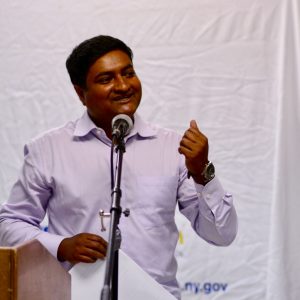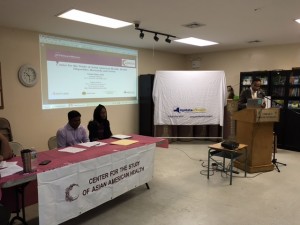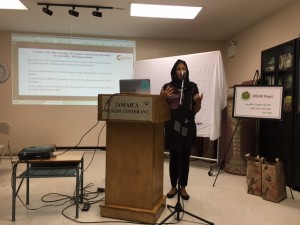New York University’s Center for the Study of Asian American Health (CSAAH) held a community health forum at our Desi Senior Center on Tuesday, September 26th. The forum celebrated the advances in the health of our seniors thanks to our partnership with CSAAH. MD Taher is the Project Coordinator for NYU’s Department of Population Health and a Community Health Worker with CSAAH. He has, for the past several months, helped to coordinate impactful health projects at the Desi Senior Center in Jamaica. “We wanted to share our results with the community, celebrate their health,” he said. Also being celebrated was our successful partnership with New York University’s Center for the Study of Asian American Health (CSAAH), which is the leading institute in the US set up to study Asian American health. Our collaboration with the institute has helped facilitate and advance several health projects.

We wanted to tell the community what our findings were, and thank the seniors from India Home, MD Taher, Project Coordinator, NYU Department of Population Health, said.
These projects fill a necessary void in care because as MD Taher said: “There are serious health concerns in the community.” One in four Bangladeshis have diabetes. One in five suffer from hypertension.
One of these projects, titled Keep On Track / Reach Far trained 26 volunteers at India Home to monitor blood pressure as part of a Community Health Assessment. Over 80 seniors from Desi Senior Center participated in the project.
Other projects too have had a direct impact on the health of our seniors. One helped to disseminate nutrition information with culturally and linguistically adapted brochures in Bengali and Hindi. “They came many, many times to the center to teach our seniors about nutrition. They gave them a cup and a spoon, taught them how to measure their food portions, ” Nargis Ahmed, the Site Director for Desi Senior Center said. Nargis worked closely with the NYU team to get seniors to try these new nutrition strategies.

The team from CSAAH shared the finding from various projects with the seniors at India Home’s Desi Senior Center.
Another important innovation has been CSAAH’s partnership with five area pharmacies to create linguistically adapted health materials in Hindi and Bengali, the languages spoken by our seniors. CSAAH also launched a nutrition strategy by working with area restaurants like Star Kabab in Jamaica to replace ingredients in common dishes so as to make them healthier. For example, switching white rice with brown in kitchurie ( a Bengali rice and lentil dish) increased its nutrition content. CSAAH has also partnered with local mosques to serve healthier foods for the iftar meal that breaks the Ramadan fast.
Other CSAAH projects like the DREAM (Diabetes Research, Education, and Action for Minorities) project, a five-year community based participatory research study, have also had success in improving attitudes toward health in the Bangladeshi community. The DREAM project aims to develop, implement, and test a Community Health Worker (CHW) Program designed to improve diabetes control and diabetes-related health complications in the Bangladeshi community in New York City. As a result of this effort at diabetes management, over 400 patients who participated across the city lost weight, became more active physically, managed their medications better and saw their doctors regularly.
The community health forum was held in the spirit of transparency and partnership and sought to update the seniors who participated in the projects and create ongoing dialogue. “We wanted to tell the community what our findings were,” MD Taher said. “And thank them.” The forum was well attended by community leaders, partners, local businesses, policy makers, and media partners.

Dr. Nadia Islam, PhD, the Deputy Director and co-investigator of the Center for the Study of Asian American Health presents findings on the DREAM Project.
The response from the community of seniors has been excellent. Even with all the barriers like work, taking care of grandchildren and busy lives, participants have been able to maintain the lifestyle changes they made as a result of the projects. India Home is happy to have done its part in improving the lives of our seniors. In the face of the rapidly growing older adult population of Bengali seniors in New York City, India Home’s vision is to continue to be a leading resource to our seniors and agencies and institutions that are working to respond to their changing and emerging needs. “Our seniors were very happy that they learned new things and I plan to continue to remind them,” Nargis Ahmed said.

